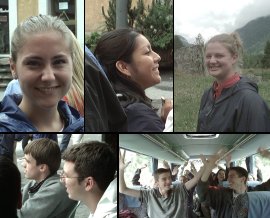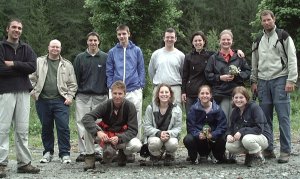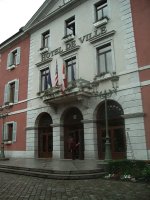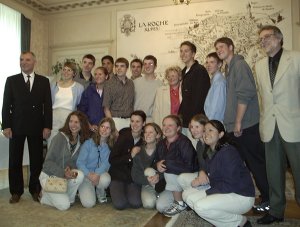|
Itinerary
|
|
• Friday, June 15
• Saturday, June 16
• Sunday, June 17
• Monday, June 18
• Tuesday, June 19
• Wednesday, June 20
• Thursday, June 21
• Friday, June 22
• Saturday, June 23
• Sunday, June 24
• Monday, June 25
• Tuesday, June 26
|
|
|
|
Monday, June 18

Pictures of arrival in Chamonix, the waterfall hike, and the roller-coaster bus ride to the hike. Notice... no hands!

Some of the Madrigals that hiked to the waterfall with our mountain guides
The wonderful waterfall we hiked to

The town center -- Notice the American flag in the middle

The gracious reception given to the Madrigals upon arriving in LaRoche with the city Mayor on the left
Some of the Madrigals with their Home Stay Sponsors
We all split up into two groups on arriving at Chamonix. One group stayed in town to take in the sites and visit the shops while the second group hiked up to an incredible waterfall. The waterfall hike was guided by three wonderful local guides.
From Chamonix, we traveled to La Roche sur Foron--the location of the Madrigal’s second concert to be held tomorrow evening.
We arrived to an incredibly gracious reception in the town center where the Madrigals met their home stay family hosts. The Mayor gave a wonderful speech welcoming the Madrigals to La Roche and provided us with a brief history of La Roche. We were all humbled and honored as the American flag was displayed outside the town center for our arrival.
We then walked to a celebration commemorating the broadcast made from England by General de Gualle telling the French people "France has lost a battle, she has not lost the war." which galvanized the French into resisting the German occupation. We watched the celebration with the community and we were invited to participate in the parade to the celebration festivities.
The Madrigals divided up among each of their home stay families for the evening.
Everyone was truly honored by the kindness and friendship given to all of us by the people of La Roche.
Reflections on the Day - Loris Nebbia
How is possible that the mountain views continue to become more impressive? We will never grow complacent about the wonders we are seeing; they are as thrilling today as when we first arrived.
As we travel to Chamonix by bus, we notice that the architectural style has changed. Typical Swiss chalets stand in villages on the mountainsides. The lower mountains have pasturelands and the Madgrials are excitedly pointing to sheep and goats and cows. We pass ancient stone bridges, and rivers colored pale green from their limestone beds. The mountaintops are hidden in mists today, and as we drive on the winding roads, we pass through wisps of clouds that wet the windows. We are soaring through clouds today, our hearts as joyful as our unusual situation.
Though our meals have been enormous and delicious, with four course dinners at the hotel each night, today the students are listing American foods they miss. “Mrs. Nebbia,” Jon Sardella says with a dreamy look on his face, “is there any way you can make us tomato soup and grilled cheese sandwiches?” Everyone laughs.
Though it has been raining for a couple of hours, the weather clears in time for our planned hike above Chamonix. Three mountain guides have been assigned to us. Our bus will take us outside the town to a good place to begin the hike.
The mountain guides look as different as if they have come from three different countries, which perhaps they have. The first, who has brown skin, black hair and eyes and a stocky build volunteers to take our eager boys on a “faster” hike. They leave very quickly, scampering off up the mountain like happy goats.
The other two guides, whose names are Xavier and Sebastian, lead the rest of the group at a more leisurely pace. Xavier, the leader of the group, is cheerful and confident. He stands over six feet tall, has light brown hair and bright blue eyes. He tells us in admirable, French-accented English, that once snow falls, he serves on the ski patrol which is a kind of police force for the winter months. Sebastian, who is not as tall as his fellow-guide, has straw colored hair, a noticeably gentle demeanor, and a kind of inquisitive look in his eyes, speaks English a bit better than Xavier as he is able to understand idioms and include jokes in his narrative. Sebastian works as a ski instructor during the winter months.
Xavier takes the lead and our group follows up a slightly sloping path through a bright green, Alpine meadow. Sebastian stays at the back, watching out for the slow walkers. The path, which is muddy from the day’s rain, takes us up the mountain past stone and timber huts, displays of wild flowers, whose names Sebastian relates –marguerites, wild butter cups with blooms as big as a scoop of ice cream, campanulas, or bell flowers, white sprays that look like Queen Anne’s lace, and a variety of mountain columbines in bright blue, deep pink, orange and purple. Two burros munch on the bright green grass beside the path.
The terrain grows rockier and steeper. Art and Peg Hill lead the way, staying close to Xavier and putting the rest of us to shame. A turn in the path takes us beside a powerful waterfall, spilling from the rocky mountainside above us. A sturdy wooden bridge spans the rocky cliffs and we cross it to a neat, bright little café hidden on the mountainside. Xavier explains that if we will follow him, we will be able to see behind the waterfall, and other wondrous sights. Who can resist? The descent is easy at first, but soon the way is slippery, in spite of wire railings and steps hewn from the rock. The view of the waterfall, thundering beside us, spraying us with icy droplets, and then the sight of the quiet valley stretching contentedly below makes the effort seem as strenuous as a blink of an eye.
We climb down more stone steps into a cave that Xavier explains is associated with a famous French adventurer. Unfortunately, his English falters here and though we ask questions, we can’t seem to get the story right. Even our tour guide, Suzanne, a British woman who speaks French (though she prefers not to do so), cannot really get the gist of it. The man’s name was Ferrier, and either he counterfeited a great deal of money, or he earned it somehow, (this is where the confusion was), and he either hid the money in the cave or he himself hid in the cave (more confusion). The space is fairly bright, and dry, and looks as if it would have been a comfortable hideout. The only version of the story that I think cannot have been right is the version that said he counterfeited the money right there in the cave. We finally abandon our quest for a clear account when Xavier begins to apologize saying, “I keep asking myself, where is my vocabulary?”
On the way out of the cave, I slice my finger open on one of the guide wires. This would not really present a problem, except that it begins to bleed noticeably, and while I am searching through my bag for an elusive band-aid, Sebastian hurries to my side. In an instant, he has opened a first aid kit, and I am asked to offer my hand for repair. I am fairly uncomfortable, because, unlike my daughter, I don’t like being the center of attention. At my reluctance Sebastian assures me that the antiseptic pad will not sting. It does, but I’m not in a position to contradict, since I want most of all to finish with this quickly. The bandage cut to size applies pressure and keeps my finger stiff so that the bleeding should soon stop. Sebastian asks if this is satisfactory or if I would prefer that he amputate the finger. Everyone laughs at this, me included, and as I assure everyone that I’m perfectly fine, I notice the slightly chagrinned, slightly envious looks on the lovely faces of the Madrigal girls. For the rest of the day, they whisper jokes about injuries they could feign in order to make Sebastian bring out that first aid kit again, but for many reasons, I’m pleased to say that no one else was hurt.
With an hour more to spend in the mountains, we choose a path up beyond the waterfall beside the swift green river that foams over enormous rocks and fallen trees. It is a wild place, steep mountain flanks rising on either side of the river, and the river moving so swiftly, making so tumultuous a roar that we must shout to hear each other. Then, the sky, moments ago sunny, goes gray and rain falls thickly. Cindy, concerned for the children’s voices, breaks into a run over the rocky path to catch those that have gone around the bend ahead. Todd follows her, running quickly, then overtakes her. Their care for our children touches us once again.
But these mountain showers, urgent as a temper tantrum, pass just as quickly, so we descend the mountain in sunshine again. Cheerful companionship characterizes the return trip. Catherine picks a few beautiful mountain flowers. Soon her friends join in her quest. Xavier and Sebastian talk cheerfully of their childhood in this valley, of Mount Blanc, of their education, and their careers. Valerie remembers a childhood song, “The Happy Wanderer.” She sings, “I love to go a wandering along the mountain path, and as I go, I like to sing, my knapsack on my back. Valerie,
Valerah, Valerah, Valerah hah…” Jon Sardella joins in harmony until the song dissolves into silliness. By this time, Catherine has an exquisite bouquet. She wraps this in a large, heart shaped leaf and presents it to Cindy “on behalf of the altos.”
On the bus, on the way back to Chamonix to meet those who have stayed behind in town, Sebastian surprises us with this request. “Since it will be – difficult—for us to – to travel—to your concert in Roche, can you give us a concert here on the bus?”
A few moments conference ensue as the Madrigals try to plan what they can sing with some members missing. Then the bus is filled with song, beautiful and spirited. Sebastian confides that he once sang in his grandfather’s choir at church when he was a little boy. Something tender flickers across his expression.
When we arrive in Chamonix , Cindy and the students sing a blessing to our guides as a thank you and a final farewell. “The Lord Bless You and Keep You…” The song is powerful in sound and meaning. Xavier is affected by it, but Sebastian is visibly moved. Tears stand in his eyes and he seems surprised by the loving touch of the Holy Spirit. As if we share one mind, we all know that God is blessing him deeply, and we whisper thanks to Him for his goodness.
It is time to part and everyone shakes hands and expresses thanks. Mr. Hill writes down names and addresses and then there are again expressions of friendship and reluctant goodbyes. God is using the Madrigal Singers to touch hearts and we are all thankful to be part of this moving experience, to be witnesses of His love, so great it transcends language, so specific it reaches strangers known well to Him, and at times, so tangible it can be known in music, in the beauty of his creation, in the quick, unexpected tears in the eyes of a new friend.
Monday evening:
The little town of La Roche Sur Foron welcomes the Madrigal Singers warmly. The bus arrives at the town square and after our long drive, we are all glad to disembark. The Hotel d’Ville (city hall) stands at the far side of the town square. A three-story building, it has been painted a rich salmon pink and adorned with white shutters in
the typical French style. All around the square, bright flowers bloom in imaginatively cultivated gardens of lavender, bright coral and deep burgundy snap dragons, with lush mounds of fuzzy purple ageratum filling the empty spaces. Adjacent to the Hotel d’ Ville, stands an old covered market building, which is really a sturdy roof,
supported by sturdier beams. The lanterns are verdigris, elegantly shaped and lit for us.
The townspeople, grinning, shaking our hands, embracing us with the gruff and eager affection of brothers, attempt to speak English as they usher us into the Hotel d’Ville and up curving marble stairs to an elegant reception prepared in honor of the Madrigal Singers. The rectangular room has wide, tall windows, which evenly divide the far wall. A sepia-colored map of the ancient part of town has been painted on the adjacent wall. An ebony grand piano fills another corner. A table, spread with bread and cheese, crackers, fruit and pastry, stands beneath the windows.
The mayor, a pleasant, formally dressed man with a scant amount of brown hair, a smiling, round brown face and merry brown eyes, motions us to gather around for his speech. His interpreter, a woman named Isabelle, who stands beside him juggling her cherubic, bright-eyed, six month old son, teaches English at the parochial school around the corner. The mayor’s speech is both formal and warm. His purpose is to welcome us and to express the happiness of the townspeople to have the Madrigal Singers in their town. They are eagerly awaiting the concert, he tells us. He explains that today, June 18, is an important holiday for France. It is the anniversary of the day during World War II, when Charles de Gaulle, telephoned his Nazi-occupied nation to urge the resistance fighters of France to mobilize and fight. The mayor tells us that in honor of our coming, he is flying the American colors. This announcement draws gasps of amazement from all of us as at his gesture, we look out the window and see our flag flying beside the French standard. He tells us that they are very happy we Americans can be here with them today, to celebrate the awakening of the resistance fighters in France. And then, he expresses his thanks to us for all that the Americans did to help France during the war. “Our resistance fought, but the Americans won the war and liberated France and we thank you.”
During the reception, we begin to mingle with our charming French hosts. Many of us try to use the French we know, and this effort, combined with the effort of our hosts to speak English proves highly successful! Cindy, who as you know is fluent in French, led the way in conversation. I, who speak only a little French, had a most enjoyable conversation about gardens with a woman who spoke almost no English. James asked his host if there were bears in La Roche and got an animated answer in French. Soon everyone has met his or her host families and we are led down the steps and out into the town to a small park. The streets have been blocked off and a small band has gathered. Facing us, a monument with plaques bearing the names of the soldiers, has been decorated with flowers. We line up across the street to watch the ceremony commemorating those of this village who fought and died for France.
Having donned a ceremonial sash in the colors of the French flag, the mayor begins the ceremony. He is joined by one of the prominent townsmen. Together they recite the name of each man from the village who gave his life. After the name is read, the solemn phrase, “Mort pour France” -- dead for France – is repeated. Some of the men have died fighting in the resistance, some were infantry soldiers, one man died at Dachau. The band begins the French national anthem, “The Marseille” and everyone comes to attention. Tears come to my eyes and I see others, French and American, swiping at their eyes. It has begun to rain, and an elderly French woman opens her patterned umbrella and steps forward to hold it over the head of one of our singers.
Art Hill commented, “We saw the essence of their culture – we saw the things that holds this society together.” Their values are admirable ones – their commitment to honor the past, to revere the brave and noble among them, their patriotism, and their hospitality, born from a profound and natural kindness – these are the qualities we found in the people of La Roche sur Foron.
As our young people went to stay in the homes of the townspeople, the adults led to a marvelous little restaurant right beside the church where we were to give the concert on Tuesday evening. The doorway was set in a low arch and flanked by windows. Inside, it looked like a bright, warm cave. The walls and ceiling were curved as if we were inside an upturned bowl and covered with a cream colored stucco. Exposed beams and ancient looking hooks suggested that the room might once have been a stable. When Cindy, in fluent French, asked our the restaurant owner about the history of the house, she could only tell us that above had been the home of a member of the bourgeoisie, but no one was sure about this room’s use. It made a charming restaurant, and the food, salad, local ham and a rich, cheesy potato casserole served from enormous copper pans, was delicious.
|
|
Today's Agenda
|
|
Morning
|
Breakfast in the hotel
Depart by coach for Chamonix
Guided walk above Chamonix
|
|
Afternoon
|
Lunch
|
|
6:00 pm
|
Arrive in La Roche sur Foron, meet with host families/check into hotel
|
|
Evening
|
Dinner
|
|
|
|







